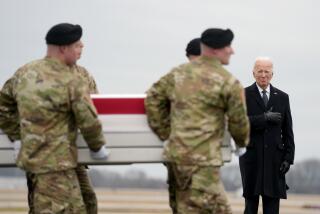Brennan CIA hearings expose fears about targeted drone killings
WASHINGTON — After years of public silence but growing frustration, Democrats and Republicans in both houses of Congress are suddenly demanding far more oversight of the secret White House program of targeted killings abroad by missile-firing drones.
Several lawmakers, particularly concerned about the targeting of Americans, for the first time say they are considering creating a special court to review who gets put on the “kill list,” and why. The goal, they say, is to impose judicial review on what has been an opaque process run from the White House and CIA.
A testy confirmation hearing Thursday for John Brennan, whom President Obama has nominated to run the CIA, unleashed built-up concerns in the Senate Intelligence Committee about what several members called the administration’s lack of accountability on the secret legal thresholds for authorizing drone strikes.
Timeline: Notable targeted killings under Obama
By Friday, that had spawned a flurry of separate demands from the House and Senate judiciary committees for classified legal opinions governing drone strikes, and the possibility of the first congressional hearings on targeted killings of Americans accused of being Al Qaeda operatives.
“The deliberate killing of a United States citizen pursuant to a targeted operation authorized or aided by our government raises significant constitutional and legal concerns,” said a letter to Obama from Sen. Patrick J. Leahy (D-Vt.), chairman of the Senate Judiciary Committee, and Sen. Charles E. Grassley (R-Iowa), the committee’s ranking Republican.
Rep. Robert W. Goodlatte (R-Va), chairman of the House Judiciary Committee, sent a separate letter requesting Department of Justice opinions governing all targeted killings, including “signature strikes” on groups of military-age men whose names are not known but whose activities indicate they are affiliated with Al Qaeda or its allies.
Those strikes have caused the most casualties, including civilian deaths. They have raised a backlash of public anger in Pakistan, where the CIA drone strikes have been most intense.
It is far from clear whether Congress has the political will to place even minimal constraints on Obama’s signature counter-terrorism effort, which polls show Americans broadly support. Drone strikes began under the George W. Bush administration, but the number of lethal attacks by remotely piloted aircraft has grown dramatically under Obama.
Over the last four years, CIA and U.S. military drone strikes have killed an estimated 3,000 suspected militants and terrorists in Pakistan, Yemen and Somalia.
The death toll includes three U.S. citizens, although only one, New Mexico-born Anwar Awlaki, was specifically targeted and killed in September 2011 as a senior operations figure in the Yemen branch of Al Qaeda.
Propagandist Samir Khan was killed in the vehicle with Awlaki in what U.S. officials called collateral damage, and Awlaki’s 16-year-old son perished two weeks later in a drone strike aimed at his companion. A fourth American was inadvertently killed by the CIA’s first drone strike in Yemen in 2002.
The Brennan hearing, and the leak of a Justice Department “white paper” Monday showing that the administration claims broader authority to kill militants than Obama and his aides had publicly suggested, have opened broad cracks in the secrecy surrounding the program.
Sen. Dianne Feinstein (D-Calif.), chairwoman of the Senate Intelligence Committee, told Brennan that she intended to “review proposals for … legislation to ensure that drone strikes are carried out in a manner consistent with our values.”
“At one point it was a limited covert program; now everybody knows about it,” Feinstein told reporters after the hearing. “And I think we need to see that this program is really run according to the American Constitution and according to law.… So I think there’s going to be a new day of transparency.”
Among the suggestions, she said, is to create something similar to the Foreign Intelligence Surveillance Court, a judicial body that operates in secret and reviews applications for intelligence eavesdropping warrants, to review drone strikes.
Sen. Angus King (I-Maine) said Friday that he supported creating a special court to review the targeting of any U.S. citizen. He said he reached that decision after the White House bowed to growing pressure this week and turned over to the Senate committee two classified opinions that the Justice Department had prepared to authorize the Awlaki killing.
“After reading the memos, it just struck me that in the case of Americans, it would be a reasonable restraint on the executive to know that they had to justify to somebody outside the executive the use of this power,” King said in a telephone interview. “This is designed to protect in some measure the due process rights of Americans.”
An Obama administration official said the president was not opposed in principle to outside review of drone strikes.
“About a year ago, the president told his team to take a hard look at ways to have some sort of independent review of counter-terrorism operations, and that includes something like [the secret surveillance] court,” said the official, who asked not to be identified discussing classified deliberations.
The team concluded that creating an outside court to authorize killings would pose political and constitutional hurdles and might prevent fast action against an imminent plot.
Other U.S. officials have said the administration is preparing a so-called playbook with rules and procedures for lethal strikes, and that they plan to shift some CIA drone missions to the military. That could increase transparency because the military does not conduct covert airstrikes.
At his confirmation hearing, Brennan said the administration had “wrestled with” the idea of a special court to help review or authorize lethal drone strikes, but he voiced skepticism.
“Our judicial tradition is that a court of law is used to determine one’s guilt or innocence for past actions,” he said. Drone strikes are launched “so that we prevent a future action, so we protect American lives. That is an inherently executive branch function.”
A former senior intelligence official expressed doubts that judges would be willing or able to oversee drone killings, even in the rare cases in which Americans are targeted. No one targeted so far had been charged or convicted in U.S. courts, and the use of targeted killings is outside American military and legal tradition.
“It’s a little interesting that to target an American overseas for electronic surveillance, you have to go to the [secret surveillance] court and show they are an agent of a foreign power,” the official added. “But to kill them, you don’t have to go to anybody.”
More to Read
Start your day right
Sign up for Essential California for news, features and recommendations from the L.A. Times and beyond in your inbox six days a week.
You may occasionally receive promotional content from the Los Angeles Times.







